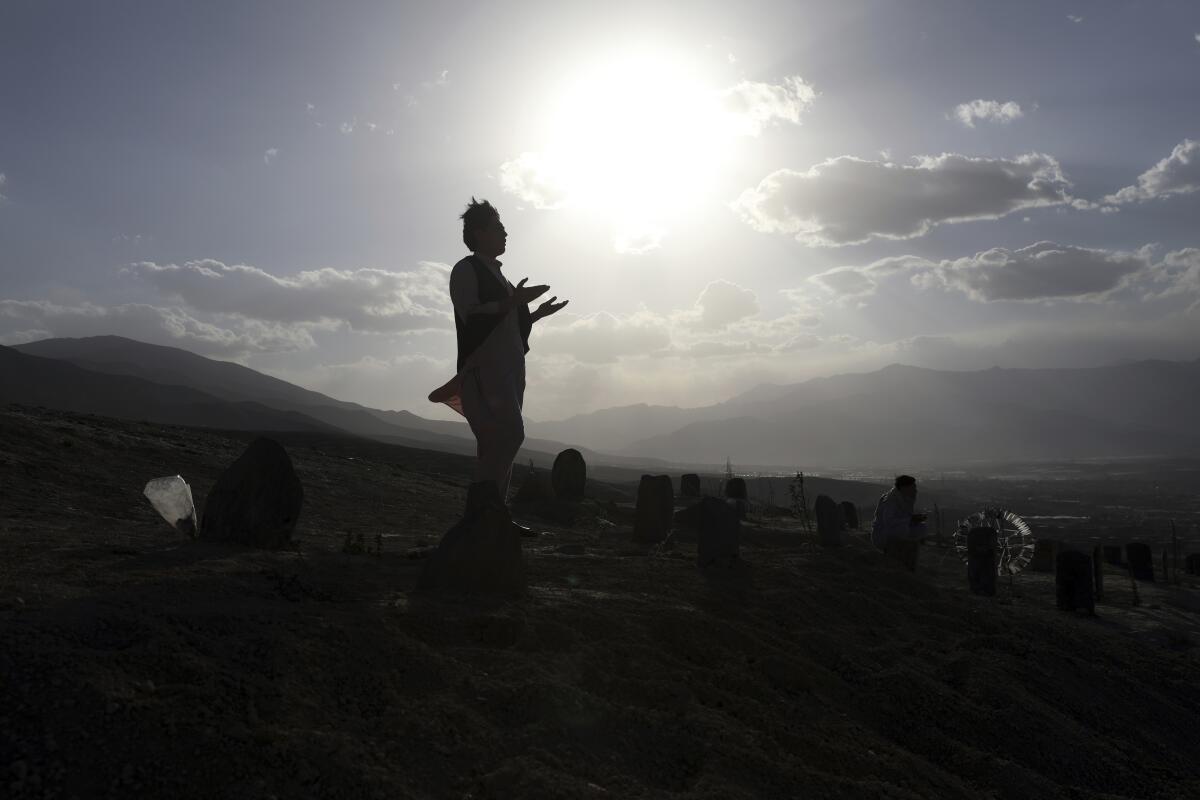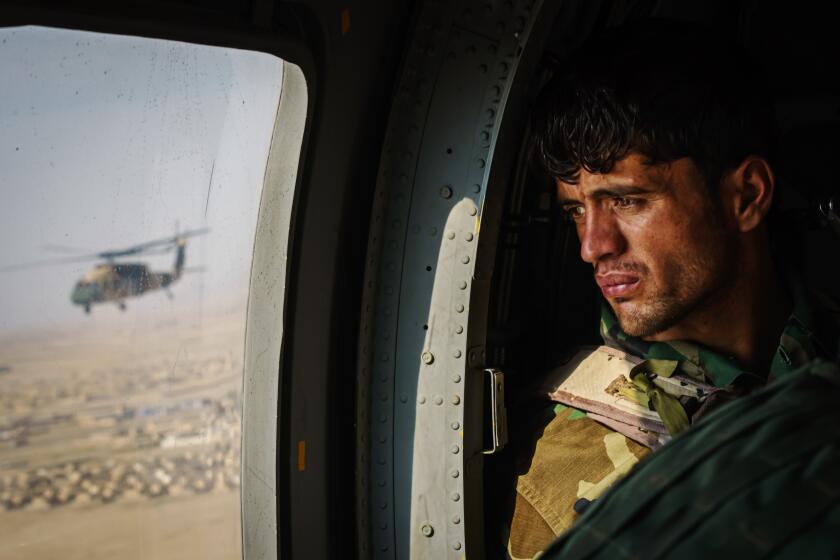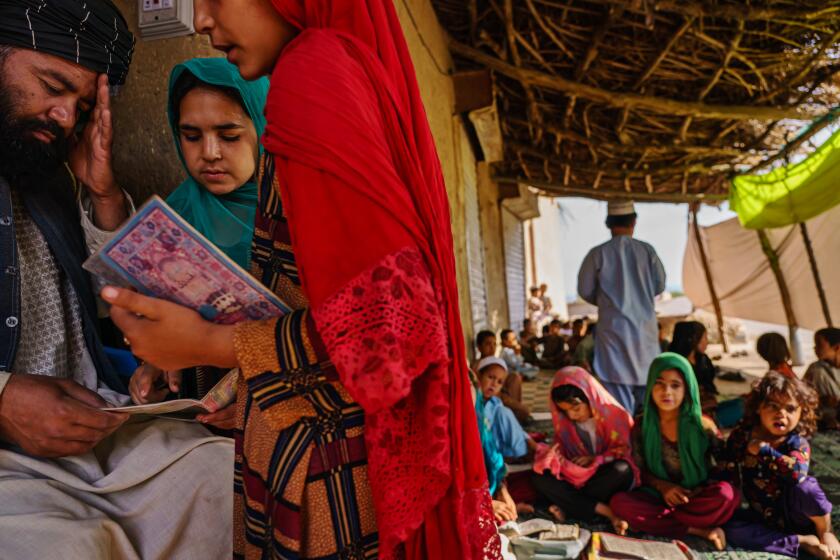Afghanistan accuses Taliban of worst violence in two decades

- Share via
UNITED NATIONS — Afghanistan’s foreign minister accused the Taliban on Tuesday of carrying out its worst violence in the past two decades and urged the international community to try to persuade the Taliban to honor a February 2020 agreement with the United States to reduce violence and enter peace negotiations.
Mohammad Haneef Atmar told the United Nations Security Council that with the withdrawal of U.S. and NATO troops “to be completed in the coming weeks,” the international community should also establish a “mechanism” to monitor implementation of the agreement reached in Qatar’s capital, Doha, and the council resolution supporting it, “and to take appropriate measures to ensure compliance.”
Under the deal, the U.S. agreed to withdraw its troops in exchange for a Taliban promise to denounce terrorist groups and keep Afghanistan from again being a staging arena for attacks on the United States, to reduce violence and work with the government on a permanent cease-fire, and enter negotiations with the government aimed at restoring peace to the war-battered country.
Atmar said in his virtual briefing at the Security Council’s ministerial meeting that the U.S. and regional partners have met almost all their obligations in the agreement, but “it’s a sad reality that the Taliban has not honored any of its obligations,” and has left the country and region “dangerously unstable,”
He pointed to the Taliban’s failure to cut ties with international terrorist groups, saying it is hosting “not only Al Qaeda but also regional terrorist groups ... in pursuit of their violence campaign against both Afghanistan and other countries.”
He urged the Taliban to explain to the world community why they said they were fighting foreign troops in Afghanistan and are “killing their fellow Afghans, and especially civilians, where the foreign troops are leaving the country now.”
The U.N. special envoy for Afghanistan, Deborah Lyons, told the Security Council she cannot overstate her concern about the situation, saying that every major trend — politics, security, the peace process, the economy, the humanitarian emergency and tackling COVID-19 — is either “negative or stagnant.”
While Afghans knew international forces would be leaving, she said President Biden’s mid-April announcement that the remaining 2,500-3,500 troops would be gone by Sept. 11 sent “a seismic tremor through the Afghan political system and society at large” because of the speed of their departure.
The U.S. spent $8 billion building an Afghan air force in its own image. But how long can it last after American forces withdraw?
A U.S.-led coalition launched an invasion of Afghanistan in 2001 to hunt down the Al Qaeda network and its leader, Osama bin Laden, who were behind the Sept. 11, 2001, terrorist attacks on the United States, and overthrew the Taliban, who during their rule imposed a harsh brand of Islam.
Biden said in April that the U.S. was leaving, having achieved its goals: Al Qaeda had been greatly diminished, Bin Laden was dead and America no longer needed its troops in Afghanistan to fight the terrorist threats that might emanate from there. On Friday, Biden will meet with Afghan President Ashraf Ghani and Abdullah Abdullah, the head of the country’s High Council for National Reconciliation, which oversees the government’s team negotiating with the Taliban.
Lyons said the Taliban’s increasing violence over the last year, even as peace talks began in Doha in September, and its latest intensified military campaign have led to significant advances for the militants.
“More than 50 of Afghanistan’s 370 districts have fallen since the beginning of May,” the U.N. envoy said. “Most districts that have been taken surround provincial capitals, suggesting that the Taliban are positioning themselves to try and take these capitals once foreign forces are fully withdrawn.”
She also pointed to a 29% increase in civilian casualties in the first quarter of 2021 compared with the same period last year, including a 37% rise in casualties among women and a 23% increase among children. She singled out the May 8 attack on girls leaving school in a majority-Hazara area of Kabul that killed nearly 100 young female students, and two attacks this month that killed 11 people clearing mines in Baghlan province and five people engaged in polio vaccinations in Nangarhar province.
As U.S. forces pull out from Afghanistan, the Taliban is in the ascendant — and threatening to retake the city that was its former spiritual capital.
Lyons said the military campaign runs contrary to a recent statement by the head of the Taliban Political Commission, which said: “We are committed to forging ahead with the other sides in an atmosphere of mutual respect and reach an agreement.”
The United Nations had hoped to accelerate stalled negotiations in Doha through a conference in Istanbul, Turkey, in April that would have been co-hosted by Turkey, Qatar and the U.N., but the Taliban never officially responded to the invitation, Lyons said, and “the drivers of conflict seem for now to overwhelm” hopes for negotiations.
Lyons urged the Security Council and regional countries to make every effort “to avoid the country going down the path of more bloodshed and suffering.”
“There is only one acceptable direction for Afghanistan ... away from the battlefield and back to the negotiating table,” she said. “The tragic history of conflict need not repeat itself — but left to its own and our inertia it just might.”
U.S. Ambassador to the U.N. Linda Thomas-Greenfield reiterated the U.S. commitment to Afghanistan’s safety and security and continuing support for its security forces and economic and humanitarian needs.
She also urged countries with influence to press for negotiations between the Taliban and the government to move forward toward a peace settlement “with the full participation of women.”
“To the Taliban, we reiterate that the military path will not lead to legitimacy,” Thomas-Greenfield said, noting that council members from Europe, Russia and China have also stressed that there is no military solution to the conflict.
“The world will not recognize the establishment in Afghanistan of any government imposed by force, nor the restoration of the Islamic Emirate” under the Taliban, Thomas-Greenfield warned. “There is only one way forward: a negotiated and inclusive political settlement through an Afghan-led and Afghan-owned process.”
More to Read
Sign up for Essential California
The most important California stories and recommendations in your inbox every morning.
You may occasionally receive promotional content from the Los Angeles Times.















